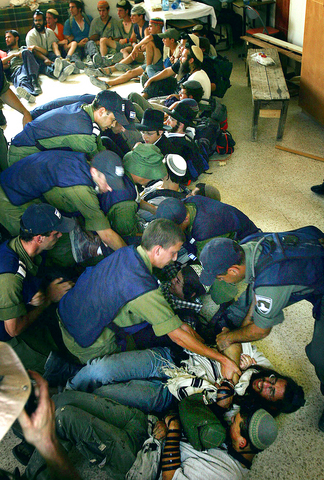Israeli forces smashed their way into two West Bank settlements yesterday and dragged away ultrarightist Jews dug in for a last stand against evacuation after failing to foil a pullout from occupied Gaza.
Police stormed a citadel and synagogues in the Sanur and Homesh enclaves that had been fortified by radicals, drawing a hail of bottles, light bulbs, paint, ketchup, eggs and cooking oil as they began extracting diehard settlers.
Some were plucked from a synagogue roof in the scoop of one of the bulldozers that had rammed through barriers of burning tires and rubbish at the gates to Sanur and neighboring Homesh.

PHOTO: AP
Palestinians want Israel to leave all of the West Bank and Gaza but Prime Minister Ariel Sharon has sworn to keep the biggest Jewish settlements in the West Bank, where some 230,000 settlers live among 2.4 million Palestinians.
Ultranationalists want to make the withdrawal from a pocket of the northern West Bank more painful than the generally smooth evacuation from Gaza, completed on Monday, to deter Israel from ever again ceding Jewish enclaves in occupied territory.
In the face of threatened violent resistance in barricaded redoubts, security forces dispensed with extended negotiations used in Gaza and moved swiftly on radicals hunkered down in three synagogues, a seminary, an old citadel and private homes.
The young ultranationalists had streamed into the two enclaves from other West Bank settlements to bolster a few dozen remaining residents holding out against evacuation.
"You cannot force us out of the land of Israel," one settler mother screamed at soldiers arriving at her door.
After brief attempts to coax out occupants, police equipped with riot batons and shields broke easily into houses and used saws, pile-drivers and sledgehammers to batter their way into two fortified synagogues and a seminary.
They found praying youths prone on the floor, arms entwined, and wrestled to separate them and haul them out to buses.
After surrounding Sanur's citadel, they bashed down the door to take on far-right religious teenagers armed with iron rods and shields, some of them dancing on its roof. A rabbi was negotiating with them to leave peacefully.
But resident settlers in both enclaves began vacating their homes without violence, walking in resignation to evacuation buses. Others, mounting passive resistance, were carried out.
By midday, about 330 radicals had been removed from 19 buildings in Sanur and Homesh, an army spokesman said.
Palestinian President Mahmoud Abbas phoned Sharon to say he hoped the pullout would open a new chapter in relations and the two agreed to meet soon, Sharon's office said. The two last met on June 21 at a tense summit.
Unlike in Gaza, which Israel plans to hand over to Palestinians in October, the Jewish state plans to retain security control of the West Bank after the pullout there.

China yesterday held a low-key memorial ceremony for the 1937 Nanjing Massacre, with Chinese President Xi Jinping (習近平) not attending, despite a diplomatic crisis between Beijing and Tokyo over Taiwan. Beijing has raged at Tokyo since Japanese Prime Minister Sanae Takaichi last month said that a hypothetical Chinese attack on Taiwan could trigger a military response from Japan. China and Japan have long sparred over their painful history. China consistently reminds its people of the 1937 Nanjing Massacre, in which it says Japanese troops killed 300,000 people in what was then its capital. A post-World War II Allied tribunal put the death toll

FALLEN: The nine soldiers who were killed while carrying out combat and engineering tasks in Russia were given the title of Hero of the Democratic People’s Republic of Korea North Korean leader Kim Jong-un attended a welcoming ceremony for an army engineering unit that had returned home after carrying out duties in Russia, North Korean state media KCNA reported on Saturday. In a speech carried by KCNA, Kim praised officers and soldiers of the 528th Regiment of Engineers of the Korean People’s Army (KPA) for “heroic” conduct and “mass heroism” in fulfilling orders issued by the ruling Workers’ Party of Korea during a 120-day overseas deployment. Video footage released by North Korea showed uniformed soldiers disembarking from an aircraft, Kim hugging a soldier seated in a wheelchair, and soldiers and officials

‘NO AMNESTY’: Tens of thousands of people joined the rally against a bill that would slash the former president’s prison term; President Lula has said he would veto the bill Tens of thousands of Brazilians on Sunday demonstrated against a bill that advanced in Congress this week that would reduce the time former president Jair Bolsonaro spends behind bars following his sentence of more than 27 years for attempting a coup. Protests took place in the capital, Brasilia, and in other major cities across the nation, including Sao Paulo, Florianopolis, Salvador and Recife. On Copacabana’s boardwalk in Rio de Janeiro, crowds composed of left-wing voters chanted “No amnesty” and “Out with Hugo Motta,” a reference to the speaker of the lower house, which approved the bill on Wednesday last week. It is

Cozy knits, sparkly bobbles and Santa hats were all the canine rage on Sunday, as hundreds of sausage dogs and their owners converged on central London for an annual parade and get-together. The dachshunds’ gathering in London’s Hyde Park came after a previous “Sausage Walk” planned for Halloween had to be postponed, because it had become so popular organizers needed to apply for an events licence. “It was going to be too much fun so they canceled it,” laughed Nicky Bailey, the owner of three sausage dogs: Una and her two 19-week-old puppies Ember and Finnegan, wearing matching red coats and silver